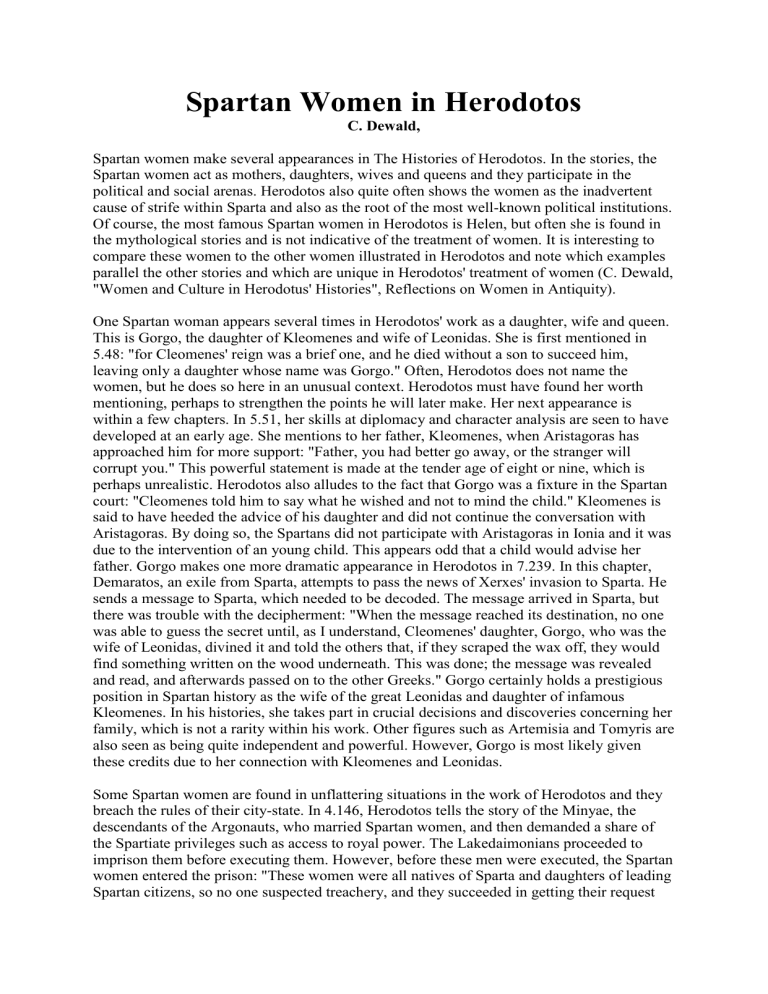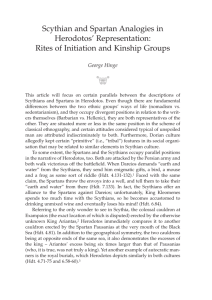Spartan Women in Herodotos

Spartan Women in Herodotos
C. Dewald,
Spartan women make several appearances in The Histories of Herodotos. In the stories, the
Spartan women act as mothers, daughters, wives and queens and they participate in the political and social arenas. Herodotos also quite often shows the women as the inadvertent cause of strife within Sparta and also as the root of the most well-known political institutions.
Of course, the most famous Spartan women in Herodotos is Helen, but often she is found in the mythological stories and is not indicative of the treatment of women. It is interesting to compare these women to the other women illustrated in Herodotos and note which examples parallel the other stories and which are unique in Herodotos' treatment of women (C. Dewald,
"Women and Culture in Herodotus' Histories", Reflections on Women in Antiquity).
One Spartan woman appears several times in Herodotos' work as a daughter, wife and queen.
This is Gorgo, the daughter of Kleomenes and wife of Leonidas. She is first mentioned in
5.48: "for Cleomenes' reign was a brief one, and he died without a son to succeed him, leaving only a daughter whose name was Gorgo." Often, Herodotos does not name the women, but he does so here in an unusual context. Herodotos must have found her worth mentioning, perhaps to strengthen the points he will later make. Her next appearance is within a few chapters. In 5.51, her skills at diplomacy and character analysis are seen to have developed at an early age. She mentions to her father, Kleomenes, when Aristagoras has approached him for more support: "Father, you had better go away, or the stranger will corrupt you." This powerful statement is made at the tender age of eight or nine, which is perhaps unrealistic. Herodotos also alludes to the fact that Gorgo was a fixture in the Spartan court: "Cleomenes told him to say what he wished and not to mind the child." Kleomenes is said to have heeded the advice of his daughter and did not continue the conversation with
Aristagoras. By doing so, the Spartans did not participate with Aristagoras in Ionia and it was due to the intervention of an young child. This appears odd that a child would advise her father. Gorgo makes one more dramatic appearance in Herodotos in 7.239. In this chapter,
Demaratos, an exile from Sparta, attempts to pass the news of Xerxes' invasion to Sparta. He sends a message to Sparta, which needed to be decoded. The message arrived in Sparta, but there was trouble with the decipherment: "When the message reached its destination, no one was able to guess the secret until, as I understand, Cleomenes' daughter, Gorgo, who was the wife of Leonidas, divined it and told the others that, if they scraped the wax off, they would find something written on the wood underneath. This was done; the message was revealed and read, and afterwards passed on to the other Greeks." Gorgo certainly holds a prestigious position in Spartan history as the wife of the great Leonidas and daughter of infamous
Kleomenes. In his histories, she takes part in crucial decisions and discoveries concerning her family, which is not a rarity within his work. Other figures such as Artemisia and Tomyris are also seen as being quite independent and powerful. However, Gorgo is most likely given these credits due to her connection with Kleomenes and Leonidas.
Some Spartan women are found in unflattering situations in the work of Herodotos and they breach the rules of their city-state. In 4.146, Herodotos tells the story of the Minyae, the descendants of the Argonauts, who married Spartan women, and then demanded a share of the Spartiate privileges such as access to royal power. The Lakedaimonians proceeded to imprison them before executing them. However, before these men were executed, the Spartan women entered the prison: "These women were all natives of Sparta and daughters of leading
Spartan citizens, so no one suspected treachery, and they succeeded in getting their request
granted. Once inside the prison, however, they changed clothes with the men, who were enabled by this disguise to pass themselves off as women and get out." It is in this passage, the treachery of the women is surprising, but their grouping is also not rare in Herodotos.
Almost all the remaining appearances of Spartan women are connected with fertility, childbirth and legitimacy, which were sources of anxiety for the Spartans. The first mention of Spartan concern for posterity occurs in 5.39 when the ephors criticize the wife of
Anaxandrides, who had produced no children. Anaxandrides, however, was of a different opinion: "his wife had been guilty of no fault, and the magistrates' advice that he should send her away and marry another woman instead was most improper--he would do nothing of the kind." However, the ephors and members of the Gerousia came to an agreement, stating "As for your present wife, we do not ask you to divorce her; you may continue to give her all the privileges she now enjoys; but you must marry another woman as well, to bear you children"
(5.40). Thus, through the queen's supposed infertility, the king took a new wife, which was a common act in Sparta. However, this first queen does become pregnant and falls under the suspicion of the second wife's family. Herodotos states, "The relatives of the second wife made a great fuss when they heard the news, and maintained--what was quite untrue--that she was pretending to be pregnant for the sake of her reputation, and meant to pass off a suppositious baby as her own" (5.41). The most important affect of the queen's fertility and king's bigamy is that the odd familial relations will cause strife between Kleomenes and
Dorieus. This, of course, is an inadvertent action of the woman, but this pattern is seen again with another Spartan family.
Often, the historical background of a political institution is connected to the actions of a woman. Argeia, the wife of Aristodemus, who gave birth to twins, basically created the infamous dual lines of kings. The Spartans wanted to make the eldest king, but they were unable to tell and they asked Argeia, who claimed to not know. However, Herodotos states:
"Actually, of course, she knew perfectly well which was which, and only pretended not to, in the hope that both of them might somehow be made kings' (6.52). The Spartans then took this question to Delphi to which the Pythia replied that, "they must let both children be kings, but give the elder one the greater honour" (6.52). They determined the oldest by judging which child was feed and tended to first and raised this brother by state funds. However, this was the root of the discord between the two lines of kings: "When the children grew up, the story goes that they quarrelled as long as they lived, in spite of the fact that they were brothers; and their descendants continued the family feud" (6.52). Thus, this Argeia allowed both her sons to become kings, but at the same time inadvertently created strife between them.
Another example of a Spartan woman, who became involved in a political situation, is told in
6.61. This woman, who was said to be an ugly baby, was taken to a shrine of Helen and transformed. After this transformation, she married Agetus, but was handed over to Ariston by trickery, whose first two wives had been infertile. Soon after the wedding, this beautiful woman--she is never named--gave birth to Demaratos, whom Ariston claimed could not be his son (6.63). Demaratos is eventually deposed due to this illegitimacy and questionable parentage. He later approaches his mother, wishing to know the true identity of his father
(6.68). She explains to him that his father could either be the phantom of Astrabacus or
Ariston himself. She says of Ariston that, "it was merely ignorance of such things which made him say what he did say" (6.69). She explains to Demaratos that, "A woman does not always carry her child till the tenth month; sometimes only seven--you yourself, my son were a seven-months child" (VI.69). This question of illegitimacy and Ariston's denial of parentage leads to the deposition of Demaratos. The women, whom Demaratos began to blame, clarifies
the situation for him. However, Herodotos may be using this as further evidence against the character of Kleomenes, who is treated maliciously in The Histories.
There are other Spartan women who make appearances as the object of a rapes or seizures.
Helen was the primary example, but there are many tales of the seizure of non-mythological women for political gain. For example, Demaratos carried off the supposed wife of
Leotychides, who was his rival (6.66). This became the origin of their quarrel and it lead to the deposition of Demaratos. In addition, there are other Spartan women mentioned as daughters who are given away in marriage to form political alliances (6.71, 7.205). While these women are influential in the alliances and dissension they create, they are rarely described by Herodotos.
The role of the Spartan woman in Herodotos is varied, but the treatment is not. The Spartan women parallel the handling of other women in The Histories (C. Dewald, "Women and
Culture in Herodotus' Histories", Reflections on Women in Antiquity). However, even though they are often cited to be the cause of strife between various family factions, they are seen as wise, sensible and active in politically charged matters. Gorgo advised her father and the general court of Sparta on pertinent matters. Argeia attempted to ensure the kingship for her twin sons, by claiming that she did not know which was the eldest. However, her actions would later be the cause of hostilities between the two brothers. Another woman is asked by her son to explain who his father is, after he is claimed to be illegitimate. She explains it in terms of the duration of pregnancies, which is more rational than her husband's denial. In
Herodotos, Spartan women are also the objects of seizure and the prizes in political and familial alliances. Overall, Herodotos, while incorporating these women into his broad frameworks, appears to treat the Spartan women with a sense of respect. If even they are committing suspect acts or become the cause of strife, there are depicted still as clever and sensible, an unusual act for a male Greek writer.
Works Cited
C. Dewald, "Women and Culture in Herodotus' Histories", Reflections on Women in
Antiquity , ed. Helen Foley (New York 1981) 91-125.








